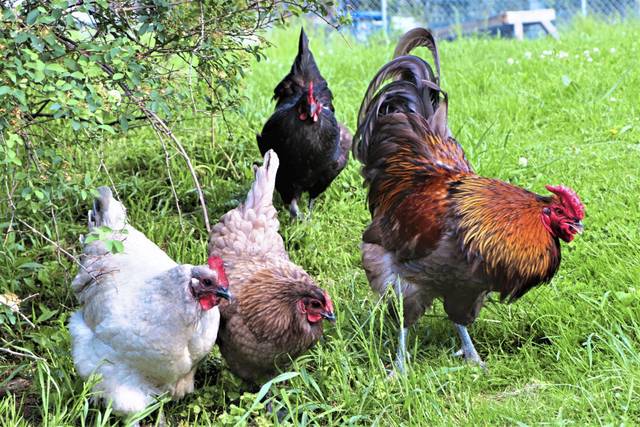After nearly two years of public discussion, McCandless has crafted a measure that sets guidelines for residents to raise chickens without running afoul of the law.
Council on May 24 held a public hearing on an ordinance that will allow residents living in single- or two-family homes, as well as people in planned residential developments and commercial zoning districts, to raise chickens.
The ordinance does not set a specific number of chickens a resident can raise, but establishes a minimum amount of indoor and outdoor space required for each bird.
The public hearing is required before council can vote to approve or reject the ordinance, which could be voted on in July.
Residents interested in raising chickens began petitioning council in early 2018 to develop guidelines.
According to a draft of the measure, residents who want to raise chickens for “personal use and enjoyment” in the permitted R-1, R-2, R-5 and R-C districts are required to have a coop in the rear yard only that provides at least 2-square feet of indoor space per bird and a run that provides at least 10 square feet per chicken.
The coop cannot be closer than 50 feet from any lot line and must have a fence or shrubs for screening that is at least 4 feet tall if it is visible from the street or neighboring properties.
The distance from neighboring properties was reduced from 100 feet because it eliminated a significant number of residents from being able to keep chickens on their properties, said RJ Susko, the town’s planning administrator.
Susko told council that rules dealing with the sanitation and maintenance of coops and what must be done to prevent them from becoming a bother to neighbors was stripped out of the chicken ordinance because the rules should be in the town’s ordinances dealing with general nuisances.
References in a draft of the new law dealing with raising chickens on so-called “hobby farms” that are not operated as a primary source of income by the property’s owners also was removed from the ordinance because no such farms exist in the town, Susko said.
Any property used to raise chickens for commercial purposes would have to be at least 5 acres, she said. The owner also would have to obtain conditional use approval from council to operate as a farm.
No residents spoke in favor or against approving the chicken ordinance.
If approved, the ordinance will establish the following guidelines:
• Renters who want to raise chickens must obtain written permission from the property owner or landlord and submit it with their application.
• Chickens cannot be kept in townhouse communities, apartment communities or mobile home parks.
• Manure and other odor-or dust-producing products must be stored at least 200 feet from a lot line.
• No roosters are permitted.
• Residents are prohibited from selling chickens or chicken products, including eggs.
• Chickens cannot be slaughtered and butchered on residential properties.
• All federal, state and local regulations, including town ordinances, must be followed.
Once the ordinance is approved by council, a second measure would have to be adopted to set the fees for the initial permit and coop inspection as well as the yearly cost to renew a permit.
In previous discussion, council considered setting the fee at $100 for the permit the first year and $50 to renew.








